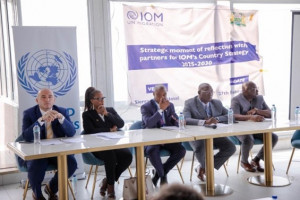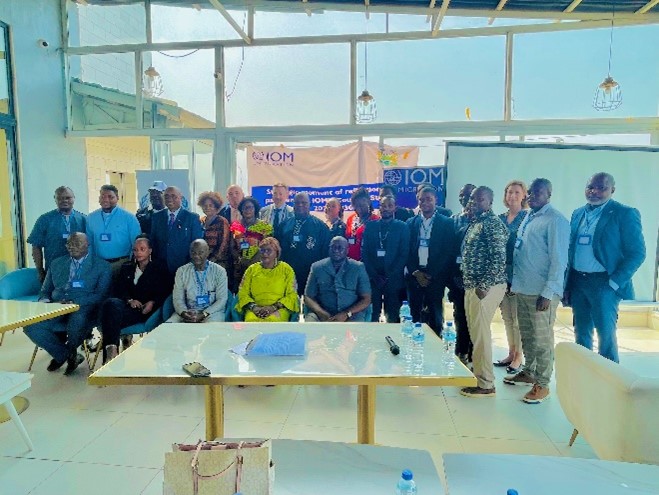By Foday Moriba Conteh
During a well-attended ceremony held on Tuesday, February 27th, 2024, at Sierra Palms Resort in Aberdeen, Freetown, the International Organization for Migration Sierra Leone concluded a one-day high-level stakeholders’ session that focused on strategic reflection for the IOM Country Strategy 2025-2030 in collaboration with its partners.
In his remarks, Christos Christodoulides, Head of Office at IOM Sierra Leone, commended the Republic of Sierra Leone for two significant achievements: the recent launch of the National Development Plan and the establishment of a dedicated migration policy.
He emphasized the importance of integrating migration into the national development agenda and highlighted the key role of the migration policy in governing migration issues.
The session, according to Christodoulides, marked a milestone in addressing the complex challenges and opportunities associated with migration, underscoring the need for a collaborative and inclusive approach involving various stakeholders, including Government bodies, NGOs, Civil Society, the UN family, academia, and the private sector.
Throughout his address, Christodoulides emphasized the importance of collective input in shaping policies and programs to address emerging challenges effectively. He stressed the need to enhance regular migration pathways while addressing issues of irregular migration, human trafficking, and smuggling.
Christodoulides reiterated the paramount importance of collaboration among stakeholders to harness collective wisdom in achieving sustainable development goals. He expressed optimism about the outcomes of the session, which aimed to shape the next country strategy aligned with Sierra Leone’s development plan and the upcoming UN Sustainable Development Program.
In closing, Christodoulides thanked all participants for their contributions and reiterated his commitment to working collaboratively towards safe and orderly migration in Sierra Leone.
Addressing attendees, Major General (Rtd) David Taluva, Minister of Internal Affairs underscored Sierra Leone’s historical significance in the transatlantic slave trade and the current dominance of internal migration, particularly rural to urban migration, driven by spatial inequalities and the pursuit of better economic prospects. Notably, Freetown in the western region emerged as the most favored destination due to its high urbanization rate.
He addressed the prevalence of irregular migration in Sierra Leone, often associated with human smuggling and trafficking, driven by poverty, leading to cases of sexual exploitation and forced labor, both domestically and internationally.
The Minister emphasized the timeliness of the session, especially amidst challenges concerning people smuggling, human trafficking, and climate change, highlighting IOM’s financial support for the safe return of migrants and its contribution to addressing climate-related issues and others in the north, which has led to conflicts between cattle herders and crop owners.
He stressed the importance of such engagements to inform and strengthen the Government’s response to human trafficking and environmental migration issues.
Addressing distinguished guests and stakeholders at the event, the UN Resident Coordinator, Seraphine Wakana, emphasized the importance of their shared commitment to ensuring safe, orderly and humane migration for the benefit of all, noting the significance of the session as a journey of dialogue and collaboration to shape the future of migration governance in Sierra Leone, marking a significant milestone in collective efforts to address human migration, one of the most pressing needs and opportunities of our time.
Having recently participated in the launch of the Medium-Term National Development Plan (2024-2030), Wakana expressed her delight in being part of the consultation and visioning meeting for the IOM Country Strategy 2025-2030, highlighting the crucial role of efficient and effective migration management in achieving the goals outlined in the National Development Plan.
She commended the IOM Country Office for its instrumental role in addressing migration needs and fostering sustainable development in Sierra Leone since 2001. The Resident Coordinator praised their dedication to migration management and governance, particularly in the face of complex migration dynamics driven by historical legacies and contemporary realities.


She underscored the importance of aligning efforts with global frameworks such as the Sustainable Development Goals (SDGs) and the Global Compact on Migration, which provide a roadmap for addressing migration challenges while promoting sustainable development and ensuring the protection of migrants’ rights.
Seraphine Wakana concluded by calling for the continued commitment to leaving no one behind and ensuring that migration is safe, orderly, and beneficial for all. She emphasized the importance of collaboration and partnership in harnessing the potential of migration to drive development, promote social cohesion, and build resilient communities. She looked forward to productive discussions and fruitful outcomes from the meeting.
In his keynote address, Rev. Dr. Jonathan Titus-Williams, Deputy Minister of the Ministry of Planning and Economic Development, emphasized the significance of the discussion in shaping Sierra Leone’s development agenda.
Dr. Titus-Williams extended a warm welcome to participants, recognizing the importance of their presence in reflecting on national issues critical to informing the next IOM Country Strategy. He expressed gratitude to the IOM Country Team for their longstanding partnership with the Government of Sierra Leone and for organizing the strategic reflection session.
The Deputy Minister underscored the session’s alignment with Sierra Leone’s development aspirations, particularly with the recent launch of the Medium-Term National Development Plan (MTNDP 2024-2030). He highlighted the strategic direction outlined in the Plan, focusing on the “Big Five Game Changers” and “Key Enablers” aimed at driving inclusive and sustainable growth in Sierra Leone.
Dr. Titus-Williams emphasized the relevance of the MTNDP’s policy areas to IOM’s operational focus in Sierra Leone, particularly in addressing migration needs and challenges. He expressed confidence that the Plan would provide strategic guidance for formulating the new IOM Country Strategy.
Looking ahead to the implementation phase of the MTNDP, Dr. Titus-Williams urged participants to provide critical inputs to enrich the next GoSL-IOM Country Strategy. He called for frank discussions to ensure alignment with strategic policy actions outlined in the MTNDP.
Dr. Titus-Williams acknowledged and appreciated the IOM Country Team’s support across various sectors in Sierra Leone in recent years. On behalf of the Government of Sierra Leone, he officially opened the one-day Strategic Moment of Reflection on the Preparation of the next IOM Country Strategy for 2025-2030, wishing all participants fruitful deliberations.
The statements were followed by presentations on various topics after group sessions.




